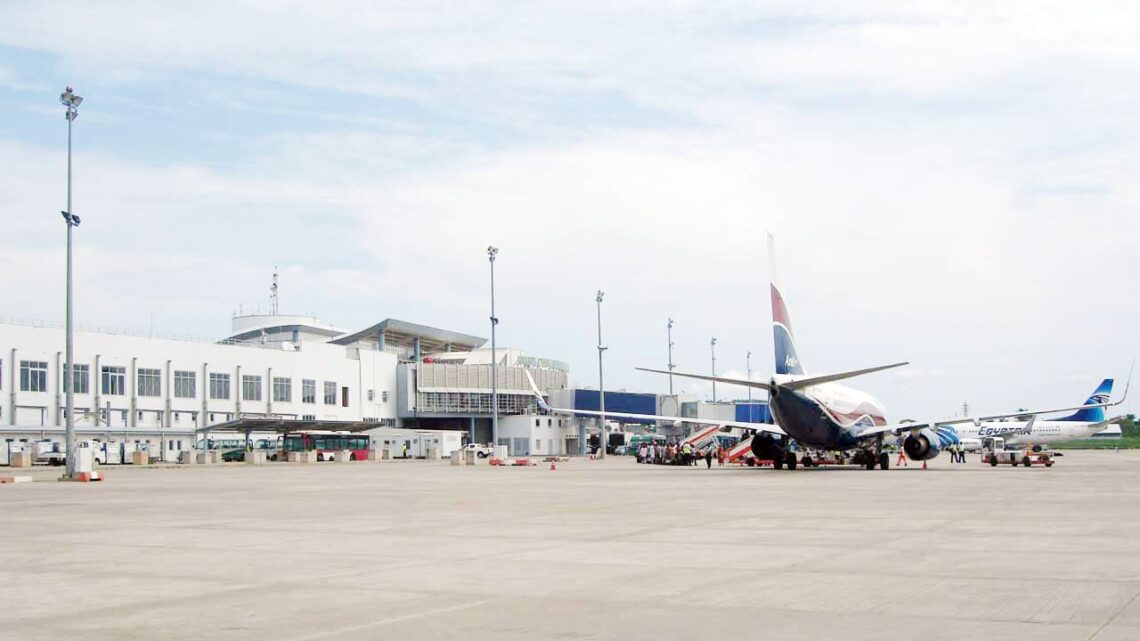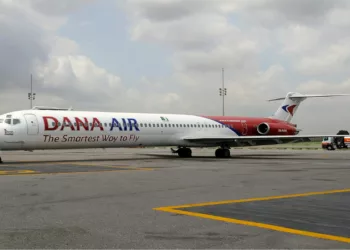Aviation workers union recently disrupted activities at most of the nation’s airport, demanding that the aviation bill before the national assembly must not be signed up until issues raised are addressed.
The unions which downed tools are the Air Transport Senior Staff Association of Nigeria (ATSSSAN) National Association of Aircraft Pilots and Engineers (NAAPE) National Union of Air Transport Employees (NUATE) Association of Nigerian Aviation Professionals (ANAP) and Amalgamated Unions of Public Corporations, Civil Service Technical and Recreational Services Employees (AUPCTRE).
At the Nnamdi Azikiwe International Airport Abuja, the union protested the new insertion in the Aviation Bill before the national assembly that classifies them as essential service providers.
The workers who took their protest from the international wing of the airport up to the entrance gate of the airport.
Speaking at the protest, the state council chairman of the National Union of Air Transport Employees (NUATE) Abuja Comrade Dauda Nambol , said the protest was premised on the illegal clause inserted into the Aviation Bill
He explained that classifying them as essential workers means that they would be exempted from all the instrument of their actions, they would not be allowed to carry out strikes, picketing or lock-out, saying these are the instrument of their struggles as enshrined in the International Labour Organization (ILO) convention.
“We are comrades and this is our right as workers if we fill dissatisfied over any issue, we have the right to protest and we will not allow anybody take away that right. We are calling on the President not to assent to that bill because that bill is anti-labour and we will make sure we win that struggle,” he stated.
Nambol warned that after the peaceful protest, they have given the government two-weeks to retract the clause, saying failure to do so, they would use all the available instrument to ensure they achieve their struggle.
The controversial clause inserted into the bill for an Act stated that “ All services which facilitate and maintain the smooth, orderly and safe take off, flight and landing of aircraft, embarkation and disembarkation and evacuation of passengers and cargo respectively in all aerodromes in Nigeria are hereby designated as essential services pursuant to the provisions of Section 11(1) of the Constitution of the Federal Republic of Nigeria, 1999 (as altered).
“The minister may by regulations prohibit all or such class or classes of workers, officers and other employees or persons whether corporate or natural, engaged in the provision of services specified in subsection (1) of this section from taking part in a strike or other industrial action.
“The provisions of the Trade Disputes (essential Services) Act, Cap. T9, Laws of the Federation of Nigeria, 2004 shall apply to service in the Agency, facilities managed by the Agency and in the implementation of this Bill. (2) There shall be no strikes, lock-outs, pickets, blockades, service disruptions, etc of any kind within all facilities managed by the Agency and where any labour dispute arises, such dispute shall be resolved by the agency.”
Also speaking, secretary general, NUATE, Comrade Abba Ocheme said, “We issued ultimatum is those obnoxious clauses that contravenes labour law, they want to take away the rights granted by labour laws to unions and workers. The laws have to go because unions and those laws cannot cohabit
“There was a public hearing and those laws didn’t come up during the public hearing for the bills of other agencies except that of NCAA and when it came up for that of NCAA, we drew the attention of the national assembly to the fact that court has ruled that airlines don’t render essential services so they still put it on the NCAA and for that reason it came up during public hearing and we told them that the court has ruled so the clause doesn’t have legal backing because airlines doesn’t render essential services so we thought that already ended the matter and we continued with the NCAA Act because it’s an act of lawlessness and they have decided to disregard the rule of law.
“So, for the other agencies, it wasn’t there at all, they just inserted it their now particularly that of FAAN. So instead of expunging it from the NCAA Act, they multiplied it to other agencies and definitely we can’t cohabit with that law. It is unlawful and it contradicts existing laws and contrary to subsisting ruling of court of competent jurisdiction.
“We will disobey the law, because we have a court of competent jurisdiction ruling, and I believe the president cannot be above the law nor is the national assembly.”
Investigation also revealed that the strike was due to what the union described as oppressive clauses in the new bills governing affairs of the Nigerian Civil Aviation Authority (NCAA), Federal Airports Authority of Nigeria (FAAN) and four other aviation agencies.
The unions said the clauses were a ‘subtle attempt’ to restrain their powers and obliterate unionism, threatening to proceed on industrial action if their requests for withdrawal of the bills are not granted before the next 14 days.
The development, however, left passengers stranded, as they struggled to get the necessary information, and flight directives amongst others in the airport.
Meanwhile, the special assistant to the minister of aviation on media, James Odaudu, said the contentious laws have been in place since 2006 and not surreptitiously inserted in the new CAA Act as alleged by the union.
The 2006 Civil Aviation (repeal and re-enactment) ACT 2006 section 67 (1) and (2) page 40, 67 (1) stated that “All services which facilitate and maintain the smooth, orderly and safe take off, flight and handling of aircrafts and the, disembarkation and evacuation of passengers and cargo respectively in all aerodromes in Nigeria are hereby designated as essential services pursuant to the provisions of section 11 (I) of the Constitution of the Federal Republic of Nigeria.
“(2) The minister may by regulations prohibit all or such class or classes of workers, officers and other employees of persons whether corporate or natural, engaged in the provision of the services specified in subsection (1) of this section from taking part in a strike or other industrial action.
“ (3) In this section, ‘strike’ means the cessation of work by a body of persons employed, acting in combination or a concerted refusal or a refusal under a common understanding of persons employed to continue to work for an employer in consequence of a dispute, done as a means of compelling their employer, or the Government of the Federation of Nigeria or any part thereof, or to aid other workers in compelling their employer or any persons or body of persons employed, to accept or not to accept terms of employment and physical conditions of work or any government economic policy or pricing of any essential product; and in this definition –
(a) “cessation of work” includes working at less than usual speed or with less than usual efficiency without reasonable operational justification; and (b) “refusal to continue to work” includes a refusal to work at usual speed or with usual efficiency.”
Reacting to the protest and deadline, Odaudu, who quoted the said 2006 CAA Act said said, “Above is what the unions are accusing the authorities of surreptitiously inserting in the new CAA Act. It has always been there, but the authorities only refused to implement them in the spirit of industrial harmony.”





